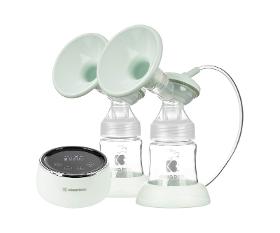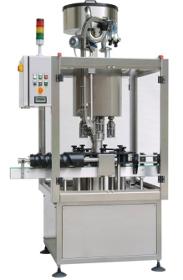- europages
- >
- COMPANIES - SUPPLIERS - SERVICE PROVIDERS
- >
- feeding bottles
Results for
Feeding bottles - Import export

BABYBRANDS
Greece
Three modes: Massage (1-5), pumping (1-9) and Bionic mode (1-5) with a variety of suction levels Memory function allows you to use it faster and easier Zero reverse flow even if the milk bottle is turned over, the milk will not flow back to the main unit and will not destroy it LED touch screen Lightweight and portable designed for moms on the go Large 1400 mAh lithium battery Nipple set for easy feeding everywhere Large bottle capacity 150ml Soft silicone cover – diameter 88/24 mm Compact structure, robust and practical BPA-free Dimensions: Breast pump: 22×9.2×15 cm, Control: 10×5.2×10 cm Weight: 0.28 kg
Request for a quote
TASK ITALY SRL
Italy
These cappers are designed for closing aluminum or plastic screw caps, or crown caps, on cylindrical or shaped bottles. Caps feeding is done using a centrifugal, rotary, or vibratory feeder, and the transfer of the caps is achieved through a descending channel that ends with the distribution head. The stainless steel threading heads with 4 rollers (with 'no cap/no roll' device) allow for excellent threading and capping of a wide range of caps. Standard features include: - Centrifugal Feeder - Inverter for speed adjustment - PLC for cycle control - Production display and anomaly signaling - Bottle height format management from PLC - 2 photocells on the cap descent channel - Photocell for exit accumulation control on the conveyor belt - Inlet selection screw - Safety guards and stainless steel electrical panel - Electric lifting of the capping head Production capacity: from 3,000 to 12,000 bottles per hour.
Request for a quote
INDEPETRO
Iran
Transparency, excellent toughness, thermal stability and a very good dimensional stability make Polycarbonate (PC) one of the most widely used engineering thermoplastics. Compact discs, riot shields, vandal proof glazing, baby feeding bottles, electrical components, safety helmets and headlamp lenses are all typical applications for PC. Polycarbonate is most commonly formed with the reaction of bis-phenol A (produced through the condensation of phenol with acetone under acidic conditions) with carbonyl chloride in an interfacial process. PC falls into the polyester family of plastics. Polycarbonate remains one of the fastest growing engineering plastics as new applications are defined; global demand for PC exceeds 1.5 million tons. Polycarbonate is available in a number of different grades dependent on the application and chosen processing method.
Request for a quoteDo you sell or make similar products?
Sign up to europages and have your products listed
Results for
Feeding bottles - Import exportNumber of results
3 ProductsCountries
Company type